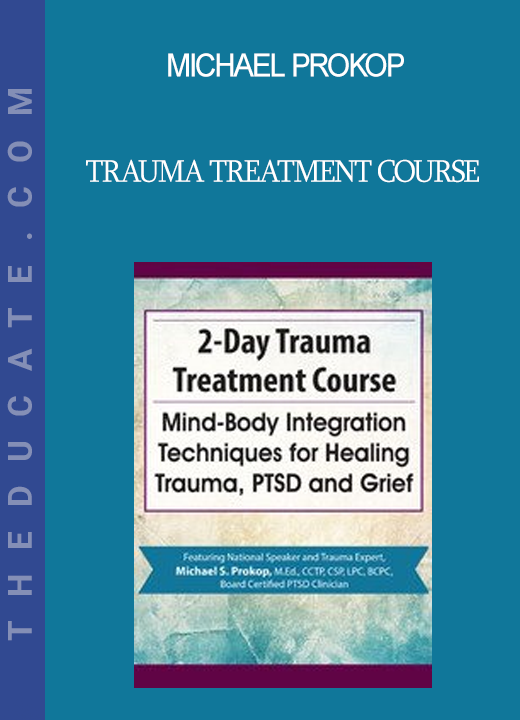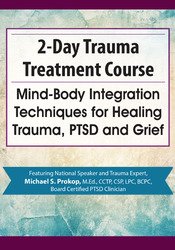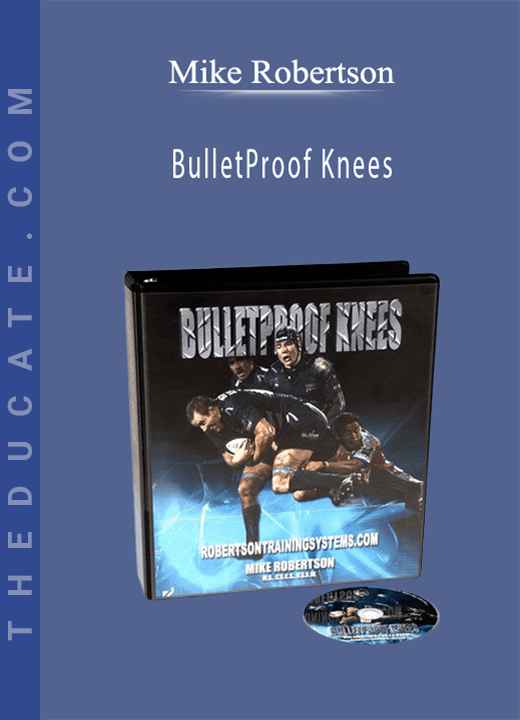Description
Michael Prokop – Trauma Treatment Course: Mind-Body Integration Techniques for Healing Trauma, PTSD and Grief
- Faculty:
- Michael Prokop
- Duration:
- 11 Hours 52 Minutes
- Format:
- Audio and Video
- Copyright:
- May 14, 2018
Description
Are you confident in your clinical work with clients suffering from trauma or PTSD?
Or do you have a pit in your stomach after a session with a traumatized client because you fear that you may have done more harm than good?
Despite our best intentions, clients are often triggered or even retraumatized by talking about their experiences before they have the skills to regulate their emotions, calm their bodies and focus on the present.
This common treatment pitfall can lead to client’s withdrawing from the experience, avoiding their thoughts and feelings, or ending therapy all together. By incorporating mindfulness skills, clinicians can help clients to tolerate distressful memories, triggers and emotions in-order-to successfully begin to navigate their trauma narrative and move into post-traumatic growth.
Watch this recording and you will take away evidence-based, best-practice clinical interventions based on the neuroscience of traumatic stress with effective mind-body treatment approaches to have better clinical outcomes! Leave this course with more confidence in your trauma work!
Handouts
| Manual (4.82 MB) | 127 Pages | Available after Purchase |
Outline
The Neuroscience of Trauma
- The Triune Brain and the neurobiology of traumatic stress
- How trauma is held in the body
- Arousal management, learned helplessness, and fear regulation
- Enhance affect regulation
- Somatic re-experiencing of trauma to “attend and befriend” traumatic body sensations and feelings
Trauma and Complicated Grief
- Stages of loss and recovery
- How trauma “freezes” the normal grieving process
- Signs of complicated/traumatic grief
- Factors contributing to complexities in grief
- Grief, bereavement in DSM-5® and viable treatment implications
Assessment of Traumatic Stress
- Diagnostic and Statistical Manual of the APA
- ACEs (Adverse Childhood Experiences) Study and Developmental Trauma
- Diagnose PTSD with the PCL-5
Treatment Approaches to Treat Trauma
- Mindfully observing sensations, feelings, perceptions, and thoughts
- Bottom-up: somatic interventions, sensory motor integration, breathwork
- Top-down: CBT, Rational Emotive Therapy, Positive Self Talk
- Horizontal: EMDR, Bilateral stimulation
Reprocess and Transform Trauma: Treatment Strategies
- Use titration, grounding, centering and pendulation
- Integrate body-oriented and neurologically-based therapy with CBT
- Embodied mindfulness
- Coherent story/experiences and metabolization of traumatic memories
- Breathwork, Progressive Muscle Relaxation, and Autogenics
- Multisensory Guided Imagery and systematic desensitization
- Self-regulation and relaxation
- Art-therapy, play and theatre movement-based interventions
- Sensory integration
- Mindfulness with self-compassion
Posttraumatic Growth: Empowerment and Resilience
- Positive Psychology Interventions
- Navy Seal Mental Toughness Model
- Instill optimism, hope, curiosity and imagination
- Forgiveness, gratitude and positive emotions
- Renewed sense of meaning and purpose
- Use signature strengths
- Enhance relationships and social support
- Self-esteem, self-efficacy and resilience
- Volunteering and giving
- Reconnection to self, family, society and hopes/dreams
Traumatized Children and Adolescents: The Developing Brain, Body and Mind
- High risk characteristics, pre-natal and early life trauma
- Mirror neuron systems, attachment, RAD and brain development
- Disassociation, self-blame, guilt, and shame
- Self-regulation, Interpersonal Neurobiology, impulse control, and frustration tolerance
- Integrate Body Work and Trauma Focused CBT for children
- Brain-based interventions
Limitations of Research and Potential Risks
- No “one size fits all” for any modality of trauma treatment
- Various definitions of trauma with different treatment implications
- Side effects may include an initial increase in symptoms
- Empirical verses anecdotal evidence
Faculty
Michael Prokop, M.ED., CCTP, CSP, LPC, BCPC Related seminars and products: 2
Michael S. Prokop, M.Ed., CCTP, CSP, LPC, BCPC, is a national speaker, Certified Clinical Trauma Professional, Consulting School Psychologist, Licensed Professional Counselor, American Psychotherapy Association Board Certified Professional Counselor-Diplomate, Sports Psychology Consultant and is a member of the International Association of Trauma Professionals (IATP). He specializes in grief and trauma therapy, relaxation therapy, rational emotive psychotherapy, anger management, mental toughness training, and more.
As a consulting psychologist he has conducted hundreds of psychological evaluations of traumatized clients and continues to provide individual and group therapy for clients with various adjustments, intellectual, motivational and emotional challenges. His clinical expertise with traumatized clients is based on a long history of comprehensive professional experiences. These include providing support for children and families impacted by suicide, domestic violence, homicide, child abuse, sexual assault and accidental death.
Michael has authored three children’s books regarding adjustment issues and his counseling experiences include more than 25 years in private practice, school districts, part time at The Developmental Clinic, and the rest at Kent State University teaching undergraduate psychology classes, graduate level workshops and also providing psychological counseling services for the T.R.I. Program (Toward Retention Intervention). Besides his private practice, he consults in numerous schools and agencies and is an Adjunct Professor at Ashland University. As an entertaining and enthusiastic speaker, he frequently lectures and provides seminars at state and national conferences.
Speaker Disclosures:
Financial: Michael Prokop is an adjunct instructor at Ashland University. He receives a speaking honorarium from PESI, Inc.
Nonfinancial: Michael Prokop is a member of the American Psychotherapy Association; National Education Association; National Association of School Psychologists; and Ohio School Psychologists Association.







Reviews
There are no reviews yet.